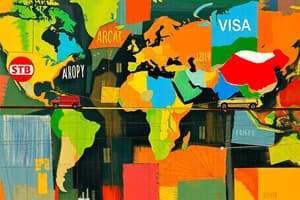Podcast
Questions and Answers
What defines a distribution channel?
What defines a distribution channel?
- A strategy for managing customer relationships.
- A marketing strategy focusing solely on online platforms.
- A centralized system for product manufacturing.
- A group of interdependent firms transferring products and information from supplier to consumer. (correct)
Which model is utilized by firms to create websites, attract traffic, and sell advertising?
Which model is utilized by firms to create websites, attract traffic, and sell advertising?
- Infomediary Model
- Online Retailer Model
- Intermediary Model
- Content Sponsorship Model (correct)
What type of model is characterized by organizations that aggregate and distribute information?
What type of model is characterized by organizations that aggregate and distribute information?
- Content Sponsorship Model
- Infomediary Model (correct)
- Intermediary Models
- Agent Models
How do buyers benefit from using brokers?
How do buyers benefit from using brokers?
Which option is an example of an online auction platform?
Which option is an example of an online auction platform?
What is the primary characteristic of virtual malls?
What is the primary characteristic of virtual malls?
Which agent model represents a single firm in selling products?
Which agent model represents a single firm in selling products?
What is a key feature of online retailers distributing tangible products?
What is a key feature of online retailers distributing tangible products?
What describes the role of shopping agents?
What describes the role of shopping agents?
What advantage do sellers gain from using brokers?
What advantage do sellers gain from using brokers?
Which aspect is NOT a benefit for sellers using brokerage models?
Which aspect is NOT a benefit for sellers using brokerage models?
What characterizes the Infomediary Model in e-business?
What characterizes the Infomediary Model in e-business?
Which of the following is a feature of online exchanges?
Which of the following is a feature of online exchanges?
In which scenario is a shopping agent model most beneficial?
In which scenario is a shopping agent model most beneficial?
What differentiates virtual malls from traditional online retailers?
What differentiates virtual malls from traditional online retailers?
Which term refers to the e-business model where firms sell through a website but additionally offer advertising services?
Which term refers to the e-business model where firms sell through a website but additionally offer advertising services?
What is the primary function of agent models that represent sellers in e-business?
What is the primary function of agent models that represent sellers in e-business?
Which of the following correctly describes the operation of online auctions?
Which of the following correctly describes the operation of online auctions?
What is a key disadvantage of using infomediary models for customers?
What is a key disadvantage of using infomediary models for customers?
Which factor is a major differentiator for direct distribution over traditional distribution channels?
Which factor is a major differentiator for direct distribution over traditional distribution channels?
What benefit do buyers gain from utilizing brokers in a distribution channel?
What benefit do buyers gain from utilizing brokers in a distribution channel?
Which model allows firms to generate revenue through targeted advertising by using consumer demographics?
Which model allows firms to generate revenue through targeted advertising by using consumer demographics?
What defines the function of a shopping agent in the e-business model?
What defines the function of a shopping agent in the e-business model?
In which scenario does an online exchange model operate most effectively?
In which scenario does an online exchange model operate most effectively?
Which statement best describes the role of virtual malls in the online retail environment?
Which statement best describes the role of virtual malls in the online retail environment?
Flashcards are hidden until you start studying
Study Notes
Distribution Channel
- A distribution channel is a network of companies that work together to move products from the supplier to the consumer.
E-business Models
-
Content Sponsorship Model: Businesses generate revenue through advertising on their websites.
- Examples: Google, Yahoo!
- This model can be combined with others to create multiple revenue streams.
-
Infomediary Model: These businesses collect and distribute information.
- Examples: Market Research firms
- Some infomediaries offer incentives (like targeted ads) to consumers who share their information.
-
Intermediary Models:
-
Brokers: Connect buyers and sellers to facilitate transactions.
-
Benefits for Buyers: Convenience, fast order processing, lower prices, reduced search time.
-
Benefits for Sellers: Access to a large pool of buyers, lower customer acquisition costs.
-
Examples: Autobytel.com (vehicles), Alibaba.com (global marketplace).
-
-
Online Auctions: Operate in B2B, B2C and C2C markets (eBay).
-
Agent Models:
-
Selling agents: Represent one company to promote their products (Amazon).
-
Manufacturer's agents: Represent multiple companies (Expedia).
-
Intermediaries: Represent a group of manufacturers, retailers, and content providers (Edmunds.com – cars).
-
Virtual malls: Host multiple online merchants (like a physical shopping mall).
-
Shopping agents: Help buyers find the best deals (CNET shopper).
-
Reverse auctions: Allow buyers to set bids (eBay).
-
Buyer Cooperatives: A group of buyers negotiating with sellers to secure better deals.
-
-
-
Online Retailer:
-
Tangible products: Distributed through traditional channels combined with online platforms.
-
Digital products: Distributed directly through the internet.
-
Direct distribution: Manufacturers sell directly to consumers (B2B and B2C) without intermediaries.
-
Distribution Channels
- Interdependent firms that transfer products/services and information from supplier to consumer.
Online Channel Members (E-business model)
- Content Sponsorship Model:
- Firms create websites, attract traffic, and sell advertising.
- Examples include Google and Yahoo!
- Often used in combination with other models to generate multiple revenue streams.
- Infomediary Model:
- Aggregates and distributes information.
- Examples include market research firms.
- Intermediary Models:
- Brokers:
- Create a market where buyers and sellers negotiate and complete transactions.
- Benefits for buyers: convenience, speed of order execution, low prices, decreased search time, and saved effort.
- Benefits for sellers: creation of a pool of buyers, reduced customer acquisition costs, and lowered transaction costs.
- Examples include Autobytel.com (vehicles) and Alibaba.com (global marketplace).
- Online Auctions:
- Available in the B2B, B2C, and C2C markets.
- Agent Models:
- Representing Sellers:
- Selling Agents: Represent a single firm, helping them sell products (e.g., Amazon).
- Manufacturer's Agents: Represent multiple sellers (e.g., Expedia).
- Intermediaries: Represent a group of manufacturers, online retailers, and content providers (e.g., Edmunds.com for cars).
- Virtual Malls: Host multiple online merchants (similar to offline shopping malls).
- Representing Buyers:
- Shopping Agents: Help buyers find products (e.g., CNET Shopper).
- Reverse Auctions: Seller bids on buyer's requests (e.g., eBay).
- Buyer Cooperatives: Groups of buyers negotiate with sellers.
- Representing Sellers:
- Brokers:
- Online Retailer:
- Tangible Products: Distributed through traditional channels.
- Digital Products: The internet is the medium for distribution.
- Direct Distribution: Manufacturer sells directly to B2B and B2C markets.
Distribution Channel
- A distribution channel is a network of interconnected companies responsible for moving products and information from the supplier to the consumer.
E-business Models
- Content Sponsorship Model: Firms build websites, attract visitors, and sell advertising space. Examples include Google and Yahoo!
- Infomediary Model: Online organizations that gather and distribute information, often market research firms. Consumers are compensated for sharing personal data and targeted advertising.
- Intermediary Models:
- Brokers: Facilitate transactions between buyers and sellers. Benefits include convenience, speed, lower prices, and reduced search time.
- Online Exchanges: Platforms for buyers and sellers to interact, examples include Autobytel.com and Alibaba.com.
- Online Auctions: Available between businesses, businesses and consumers, and consumers.
- Agent Models:
- Selling agents: Represent a single firm to help them sell products, like Amazon.
- Manufacturer's agents: Represent multiple sellers, such as Expedia.
- Intermediaries: Represent a group of manufacturers, retailers, and content providers, such as Edmunds.com.
- Virtual malls: Host multiple online merchants, similar to physical malls.
- Shopping agents: Help buyers find products, like CNET shopper.
- Reverse auctions: Buyers submit bids for products and services, such as EBay.
- Buyer Cooperatives: Groups of buyers negotiate with sellers for better prices.
- Online Retailer:
- Tangible products: Distributed through traditional channels.
- Digital products: The Internet serves as the distribution medium.
- Direct distribution: Manufactures sell directly to businesses or consumers.
Studying That Suits You
Use AI to generate personalized quizzes and flashcards to suit your learning preferences.




